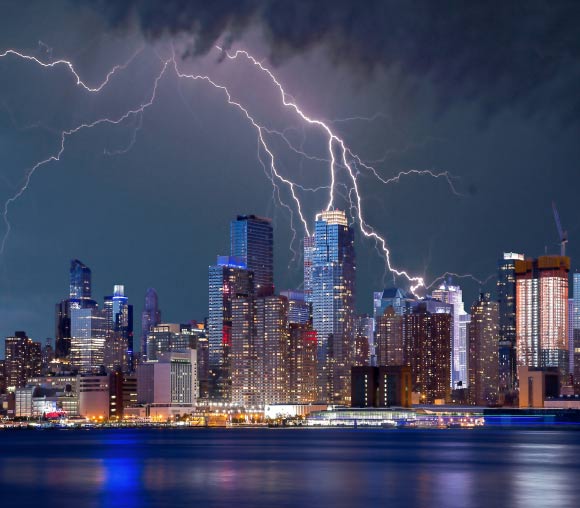A team of researchers from Lancaster University and the Universities of Edinburgh and Leeds, UK, forecasts a 15% drop in the average number of lightning flashes worldwide by the turn of this century, if global temperatures are in the top range of forecasts. The team’s work is published in the journal Nature Climate Change.

Finney et al find a 15% decrease in total lightning flash rate in 2100 under a strong global warming scenario.
“Our research questions the reliability of previous projections of lightning, and encourages further study into the effects of climate change on cloud ice and lightning,” said lead author Dr. Declan Finney, from the University of Leeds.
“This research expands our current knowledge of climate change impacts on lightning and suggests that in a warmer world, the incidence of lightning is likely to decrease,” added co-author Professor Ruth Doherty, from the University of Edinburgh.
The researchers used a novel method to calculate the likely incidence of lightning flashes from storm clouds.
Unlike traditional calculations of lightning flashes at the global scale, which are based on the height of clouds, their approach takes into account the movement of tiny ice particles that form and move within clouds.
Electrical charges build up in these ice particles, and in cold water droplets and soft hail formed inside clouds. These are discharged during storms, giving rise to lightning flashes and thunder.
The results, accounting for a 5-degree Celsius rise in global average temperatures by the year 2100, show that on average lightning flashes are less likely in future, in contrast to previous studies.
“A drop in the incidence of lightning strikes could impact on the frequency of wildfires, especially in tropical regions,” the authors said.
“It could also lower the incidence of lightning strikes to infrastructure and affect how greenhouse gases in the atmosphere contribute to climate change.”
“The results provide new insight into the likely impacts of lightning on future atmospheric composition and climate,” added co-author Professor Oliver Wild, of Lancaster University.
_____
Declan L. Finney et al. A projected decrease in lightning under climate change. Nature Climate Change, published online February 12, 2018; doi: 10.1038/s41558-018-0072-6







